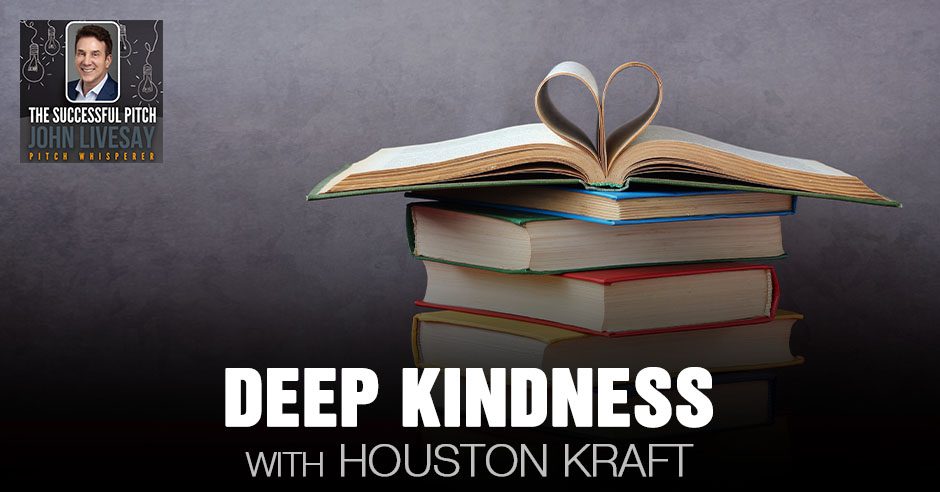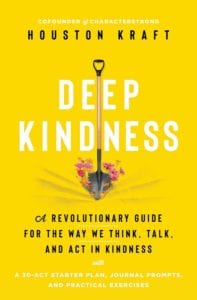Deep Kindness With Houston Kraft
Posted by John Livesay in podcast0 comments
Everyone can agree that kindness is a vital character everyone must possess, but in today’s world soaked in ambition, achievements, and ego, its meaning sadly wanes day after day. Houston Kraft, the author of Deep Kindness, believes that this can still be remedied by integrating the idea of kindness in the education system. Together with John Livesay, he discusses how providing training and curriculums centered on compassion can help change the perspective of kids in showing kindness rather than merely chasing success. Houston also explains how to bridge the empathy gap by sharing his touching story of one rainy night in Haiti.
—
Listen to the podcast here
Deep Kindness With Houston Kraft
Our guest is Houston Kraft, a professional speaker, author, curriculum designer, and kindness advocate who speaks at schools, conferences, and events internationally. He spoken to over a half a million people at 600 engagements and counting. He’s the Cofounder of CharacterStrong, which is training and curriculums that create more compassionate cultures in schools and communities. They work with 2,500 schools serving over a million students with their content. In 2019, he was featured by Lay’s on BBQ and Jalapeño chip bags for their spreading smiles campaign. His first book, Deep Kindness, is being published. Welcome to the show, Houston.
Thanks, John. It’s always nice to have kind things that you helped write read back to you. I don’t know what to do.
It’s quite a journey. What I love about your website is these pictures of you as a young boy. I’m imagining, there’s a story there of what got you into wanting to be involved with schools and students, as well as this a-ha moment of when you realize that kindness was going to help you through something.
My roommate, who’s a comedian and amazing storyteller says, “I was in middle school and I hugged someone and said, ‘I can monetize that.’” His joke for how I’ve ended up where I’m at. It’s not how it happened. My world has revolved around the practice of kindness for a long time. In my senior year of high school, I came together with a group of friends and we started a club at our school that was about weekly kindness practice. That was the premise. It’s protected time to put into action. What we believed was we knew we wanted our school to be a more compassionate place.
[bctt tweet=”The more anxious people are, the less empathetic they become.” username=”John_Livesay”]
We wanted people to feel accepted, belonging and safe in our schools, organizations and for our world. We thought, “What is the most practical way to make sure that we did that on a weekly basis?” That was a turning point for me was the experience of running that club with friends and watching it grow, feeling the joy that I got from participating and practicing kindness. My world and life ever since have been like, “How do we do this for more people in more places?”
What did you decide you’re going to major when you were in school? Did you think you might be a teacher? How did you get to this level where you are now writing books and speaking about it?
Mostly on accident. My two big passions in high school were theater and student leadership. When I got to college, I’m at student leadership, I said, “What does that look like in the real world and politics. I’ll be a politician.” I took one political science class and I was like, “No, I’m not going to be politician.” Acting was my other passion. I went to Los Angeles, the summer after my freshman year. I worked on a movie with Lindsay Lohan. I was like, “I’m not going to be an actor either.” I realized that the fusion of the two was speaking in schools. I got to be a storyteller, performance aspect, but I also got to talk about how to lead in a way that had integrity, that was focused on service and compassion in the world. That’s what I started doing. As I was finishing college, I was beginning to speak on stages and here we are.
Do you find that people are asking for you more than they were even many years ago because of bullying issues, school shootings and things like that? If that’s on the opposite end of what you’re teaching and no matter where you stand on gun control, the whole point is how do we prevent people from feeling isolated and angry that they need to act out is most likely not a lot of kindness coming to them in their childhood.
My ultimate aim is to work myself out of job, and yet, I feel busier than ever, which is tough. It is the context of the world. We’ve always had challenges and access to information distribution that allows us to be more conscious or aware of some of the challenges that we already had. As we communicate information more quickly and widely, the way that we speak about things to me is what I’ve grown to be passionate about. In some ways, it’s why I wrote the book. The language we have around kindness doesn’t do kindness a service.
Tell me more about that.
With every word in our world, we have the dictionary definition, cultural definition and our own personal lived experience definition. The cultural definition of kindness for most people brings to life the things that the news talks about what kindness is, which is like the pay it forward coffee lines or the high five hallways or the Post-it note that were positive. In the book, I talk about that as confetti kindness, which is not inherently bad. We’re about to celebrate World Kindness Day and there are all kinds of organizations that promote random acts of kindness. I suppose my argument is that the kindness the world needs, in my opinion, presently is not random at all. It’s incredibly specific, intentional, thoughtful. It is the by-product of listening and empathy.
As we look into the reality of how most people interpret kindness, a lot of people think about that it’s free. My argument is that kindness is not free, but it requires time, energy and comfort from us in order to in many ways be humbled and do good for people who look different, act different, talk in front of us. In a time where we have divisiveness, kindness is going to require a tremendous amount of listening and perspective taking. That’s what I’m advocating for is a new way to speak about kindness so that we can navigate those issues that even you’re alluding to more honestly. How do we tackle things like gun control or the political divide or bullying? It starts with an honest assessment of what kindness looks like in my life and how to practice it in ways that move the needle, not just the surface level of goodness that the media pays attention to.
[bctt tweet=”The language people have around kindness doesn’t do kindness a service.” username=”John_Livesay”]
I know your opening chapter is titled Something Somewhat Provocative. I love that it grabs the attention with my storytelling and advertising background, which is the kindnesses. I thought, “I guess it isn’t.” What can a parent or teacher do to change that, so that it wouldn’t be normal for a child to do the kind thing first as opposed to it not being the norm?
To me it’s a little bit gentle attack on how we perceive ourselves versus what we do in the world. One of the studies that I think about often comes out of Harvard’s Making Caring Common project. Dr. Richard Weissbourd asked families, “Rank for me what you would prioritize most for your kid. Would you rather they be high-performing or happy or kind?” Eighty something percent of parents said, “They’d rather their kids be happy and kind over high-performing.” It seems like encouraging data. They asked the kids of the same parents say, “What do you think your parents want you to be, high-performing, happy or kind?” The data is the exact opposite. In fact, one of the clever distillations of the study, they said, “The vast majority of kids said that their parents would rather they get good grades, than be a good people.” Which to me runs counter to the argument of most parents or teachers or whoever would say, “We want our kids to be kind.”
The question becomes, “Do we allocate our time, energy, resources, education in order to make that real? What questions do we ask?” The family, when the student gets home is like, “How was your day? What did you learn? How was the test? How was practice?” It’s all about them versus my friend Keith Hawkins have a beautiful paradigm shifting question which is, “What did you do for others today? Who did you serve today? Would did you help?” Those are the questions that rarely get asked. As a result, for the younger generation, they pay attention to more so the indirect communication than they do the direct communication. Most of our indirect communication would say that achievement is more important than generosity.
I love this because I was interviewed by NBC on how to help parents get more than a one-word answer out of their child when they come home from school. With school and you get fine. What I suggested was ask your child, “Tell me a story about the best part of your day,” and then the child can decide beginning, middle, or end. Ideally, the parent tells a story and then you start teaching your child storytelling skills, but this takes it to another level, which would be, “Tell me a story about what you did to help somebody else today.” It would be even more aligned with what you as a parent value. Therefore, the child would then say, “That’s the story they want to hear. Not the best part of my day was I got an A or my team won or whatever the performance measures would be.” Let’s talk about what you described here as the empathy gap. What’s your definition of empathy? Where is the gap occurring?
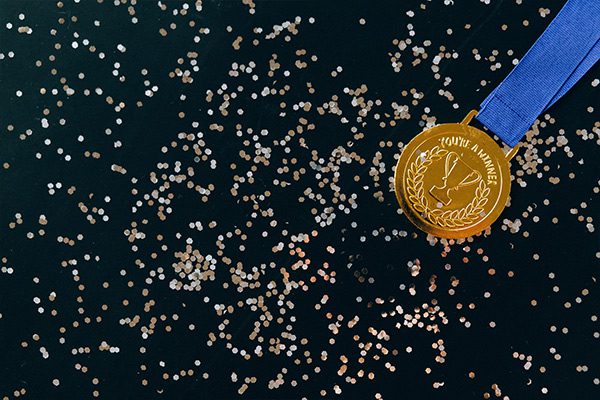
Deep Kindness: Most indirect communication would say that achievement is more important than generosity.
The definition of empathy is going to require a couple of episodes for me to delve into it a bit more because in the context of kindness, my friend Barbara Gruner has a lovely phrase. She says, “Empathy gives kindness its why.” Which is to say, kindness without empathy, which we can reinterpret for the context of at least as listening and understanding perspective taking. Usually, that kindness is going to serve me more than it does you. To bring an example to it, after the Sandy Hook shooting, this national global tragedy, where there was moment of collective need, people wanted to give kindness to this community who was hurting.
People from all over the world sent stuffed animals or teddy bears, but Newtown, Connecticut had to rent a 20,000 square foot warehouse to house all the inbound gifts. One of the people that helped plan the candle light vigil in a profound quote he said, “There were more stuffed animals present than there were people. A teddy bear is great, but a teddy bear doesn’t pay for counseling and a teddy bear doesn’t pay for a funeral.” I reinterpret to mean, you gave me something that made you feel good, but it wasn’t what we needed. Empathy to me plays a huge role then in our ability to practice kindness effectively, because if I don’t listen to what you need, then I’m giving what I’m projecting you need, as opposed to potentially what you are in need of at the moment.
That might require asking a question of what you need versus thinking, “I’ll send him teddy bear, because that’s what I would like.” That’s easy than taking that extra step. Empathy, as you are saying is not just, “I feel sorry this happened to you,” but literally listening into what it feels like now and what would be the best way or thing I could do. That’s the gap. We think we’re being helpful and showing some, “I’m sorry.” There’s a big difference in my opinion between sympathy and empathy. I think you’re narrowing it down. Sympathy is you send a teddy bear and empathy is you take the time what I’m hearing you say to find out, “You need counseling? Let’s figure out a way to get that right.”
Not empathetic kindness lets me feel like the hero without ever even acknowledging whether or not I’ve made a difference. The gap itself is not in between intention and reality. The gap is between our ability to do it for others and how we’re feeling in the moment. The empathy gap, the term itself comes from Dr. Michele Borba, who spent 30 years researching empathy. She says that the biggest barriers in her research between why we wouldn’t be empathetic to another person or a group of people are anxiety, fear, and narcissism.
[bctt tweet=”Personal relationships will fall short when we prioritize things that do not lead to success.” username=”John_Livesay”]
She goes, “When any of those increase, empathy decreases.” If you think about the reality of the world, where we’re seeing at the huge increase in anxiety and fear, the by-product of that is decreased empathy. She says, “The empathy gap widens as anxiety increases.” The more anxious we are, the less empathetic we are as a culture. If you look at students, the data would tell us the average student now has as much anxiety than the average psychiatric patient from the 1950s. Empathy has dropped 40% in the average college aged students since the year 2000. She correlates that data. She’s like, “It makes sense. The more worried I am about what’s going on in my world, the harder time I’m thinking about what’s going on in yours.” Collectively, the more anxious we get, the more disconnected we get and the more disconnected we get, the harder it is to practice empathy in our life. It’s a little bit of a vicious cycle that creates that loneliness that we’re sensing in our world.
That’s what you talk about here that we created a lonely generation, not just a few people who don’t have friends that even people who have all that are still feeling lonely. It’s not how many people are in your life. You can still feel lonely if you’re not connected to people beyond your own fears and anxieties is what you’re saying.
If our own personal metrics of success are about winning or achieving, which mine for many years were unconsciously around that. I found myself successful and lonely. I was busy. I was traveling to the new school or event every single day, but personal relationships, my friendships, all the things that also mattered in my life had fallen short because I was prioritizing the thing that I thought was success.
You have a section here on incompetence and talk about empathy is standing in the rain. Can you expand on that a little bit?
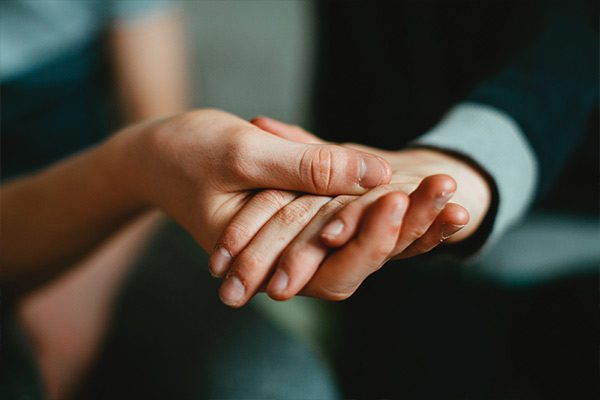
Deep Kindness: The empathy gap is between the ability to serve others and how you are feeling at the moment.
We get to go down the storytelling route if you want. Many years ago, I had a chance to work in Haiti, alongside my friend, John. He lived in Haiti for over twenty years in American living there because he wanted to make an impact in a community where he saw tremendous need. I was lucky because back in the early 2010s, John was building a school in a poor area of Haiti called Bourjois about an hour outside of Port-au-Prince. I landed, I’ve never been to Haiti before I get off the plane with my camera and my Fedora. I’m working perfectly out of place. We get picked up and we’re driving through Port-au-Prince. As I look around, it’s the first time I’ve come face to face viscerally with that poverty. The beauty of Haiti is the contrast. Poverty sits alongside joy eloquently. As you look around, you see evidence. Although, it had been years since the earthquake had happened, you still saw staircases on top of buildings. You saw potholes that went 8 feet into the sidewalks.
You saw shanty towns with 700 people on top of each other. We drive up to John’s house in the mountains. We pull in and a part of the school is a choir. The name of the choir is Wozo, which is Haitian Creole for bamboo. Their motto is, “We bend, but we do not break.” An attitude of resilience is a natural resource in Haiti. We pull in and we get out of the car and Wozo is singing. I don’t speak the language. I don’t have no idea what they’re saying, but it doesn’t matter. I felt like that love and that welcome is always translatable. As soon as I got out of the car, it was clear that people were gearing up for a big event.
They kept calling it the big event and it was this celebration down in Port-au-Prince by the brand Life is Good, was putting on this concert series. Wozo, the choir was going to perform there and they were pumped. Finally, the big day rolls around, the big event and Wozo, the choir shows up and the bus is three hours late to pick them up. We’re standing outside, it’s over 100 degrees. We’re all sweating. The bus pulls in and it’s not a bus.
It’s a twelve-passenger van to fit these eighteen kids to travel an hour without air conditioning, down into Port-au-Prince. We get there right when it’s about to be their set time. The person who is organizing the event has to explain that they’re running behind and they have to cut Wozo set in half. You can tell that they’re disappointed, but they go backstage. They change their robes and formal gear and they get up and sing their brains out. I have no idea what they’re saying, but exuberance and joy are translatable.
[bctt tweet=”Your primary job is to listen well to love better and suffer alongside people to understand them better.” username=”John_Livesay”]
They get off stage and it’s time to head back home. In the distance, you see this rain cloud coming in and rain in Haiti is not a gentle experience. It is aggressive. You hear the thunderclaps. You see the rain coming in and people are scurrying to get in the cars. We realized that we have another car that can fit some of the kids in the back. We take about six girls from the choir, put them in our car and we begin driving up the mountain. At one point, the thunder is loud that it feels like it’s inside the car. There’s a five-year-old in the back who’s rightfully terrified. I am too, but she starts crying. I want to say something to this girl, but I don’t speak the language. I have no idea what to say. All of a sudden, the girls grabbed her hand and they all start sing.
We drive an hour with the girls in the back, singing and comforting this little girl. Finally, we pull up to the first stop. John who created the organization, hops out of the car, opens up the back and he grabs one of the girls out of the back and it’s pouring rain. This girl’s brother is standing there waiting for him because as I learned, the roads don’t get to these people’s homes. Many of them are going to have to walk another 1 or 2 miles to get back to their homes in the middle of this rain. We do this on repeat for the next hour. Every time we stop, John gets out of the car, gets out with the girl, walks him over and talks to the family and leaves them to go. Finally, he gets back in the car after the last interaction with the girl.
This is me, his brother Jesse and John. I remember feeling so bad because they’d been gearing up for this for long. I’m like, “I’m sorry. This day has not been anything that has been planned.” Jesse in the front was like, “In the US, there would be lawsuits at these girls to walk home in the rain.” I’ll never forget John looks back and he goes, “You don’t understand the big event had nothing to do with the celebration in the park. For many of these young people, this was the best day of their life that they had this opportunity to celebrate, be seen and sing. For me, the big event was standing in the rain with those girls. If I could’ve, I would’ve stood there all night with them.”
For me, it was a paradigm shifting moment in empathy, because I thought for a long time, that empathy was this thing that you had to live it to give it. You had to live through someone’s story in order to feel bad for them or with them in what they’re suffering. The reality is for people in Haiti, my life experience, I’ve never lost someone to a treatable disease. I’ve never had to walk my house for basic necessities, like water or medicine. I do know what it feels like to feel let down, to have disappointment, to be excited to share something and to stand in the rain.
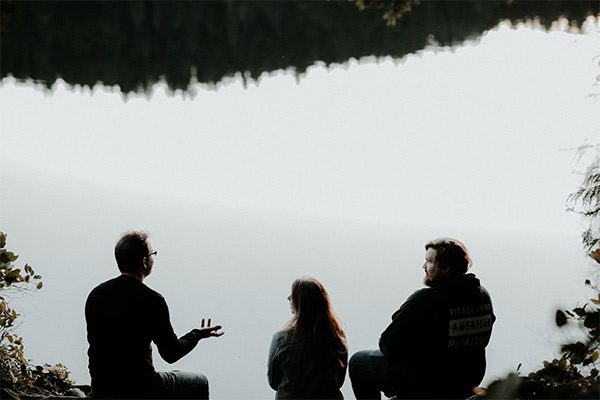
Deep Kindness: You have to live through someone’s story to feel bad for them or with them.
There’s a distinction in my mind between the levels of thy. Which is you got apathy, which means, “I don’t care if you’re in the rain as long as I don’t get wet.” You got sympathy, which is, “I’m sorry, you’re getting wet. Here’s an umbrella.” You have empathy, which is, “I’ll stand in the rain with you.” It’s to suffer alongside someone and recognize that the human experience, whether or not it’s the same story to put myself into your experience and say, “Where do we overlap?” Empathy is an exercise in intentional imagination. Whenever I think about wanting to have empathy with someone, I think about standing in the rain.
It doesn’t get better than that. That’s an amazing story. I love the alliteration of intentional imagination. I love the contrast between, “I don’t care,” to, “Here’s an umbrella,” to, “I’ll stand in the rain with you whether we have an umbrella or not,” as our new definition of empathy so that we can start to work on reducing that empathy gap with a new awareness of what empathy is. Any last thought or quote you want to leave us with Houston?
To me, the whole premise of empathy, the whole purpose of standing in the rain would be, our primary job is to listen well in order to love better and to suffer alongside people means to truly tune in to contextualize who they are through all the pieces of their identity that’s different than mine. Where you grew up, your race, your gender, your orientation, your family, your traumas, everything that you’ve lived that’s different than me makes the way that you experience a situation wildly different than how I might. To stand in the rain with someone means to give our attention to someone well enough to truly understand how their needs are different than mine because that’s what kindness is. It’s my willingness to listen well enough to truly meet your needs in a given moment.
The book again is called Deep Kindness. If people want to follow you on social media, what’s the best way to find you?
I can’t thank you enough for putting this needed message out into the world with a new framework that we can all learn how to be better at it. Kindness. Thanks, Houston.
Thanks, John.
Important Links
- CharacterStrong
- Deep Kindness
- @HoustonKraft – Instagram
- https://www.HoustonKraft.com/
- Better Selling Through Storytelling Method Online Course
Wanna Host Your Own Podcast?
Click here to see how my friends at Podetize can help
Purchase John’s new book
John Livesay, The Pitch Whisperer
Share The Show
Did you enjoy the show? I’d love it if you subscribed today and left us a 5-star review!
- Click this link
- Click on the ‘Subscribe’ button below the artwork
- Go to the ‘Ratings and Reviews’ section
- Click on ‘Write a Review’
Love the show? Subscribe, rate, review, and share!
Join The Successful Pitch community today:
- JohnLivesay.com
- John Livesay Facebook
- John Livesay Twitter
- John Livesay LinkedIn
- John Livesay YouTube
Tags: CharacterStrong, confetti kindness, education system, Empathy Gap, practicing kindness, student leadership

